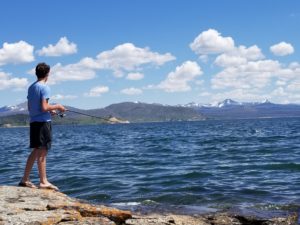NALMS Stands Behind Climate Updates Backed By Scientists Around the Globe
by Gabriella Placido, NALMS Policy Intern
With the latest science indicating that current climate trends will bring calamitous worldwide impacts, scientists around the world continue to team up to sound the global climate alarm and to encourage necessary action for the greater good.
Startling updates from scientific organizations, such as May’s World Meteorological Organization (WMO) report, suggest that the rate of climate change acceleration continues to increase at a disturbing rate. In addition, last year NALMS was one of 111 professional aquatic scientific organizations across the world that joined forces with the American Fisheries Society (AFS) on their peer-reviewed world climate statement urging immediate action on human-caused climate change. This unprecedented partnership encompassed over 80,000 scientists and aquatic professionals from all seven continents. Scientific findings such as these are a wake-up call for the largely “business as usual” approach that has been assumed for too long, and which will soon lead to inevitable consequences as shown by the data.
These reports compiled the current science demonstrating that aquatic resources and the organisms, ecosystems, economies, and people that rely on them may reach an irreversible turning point if significant actions are not promptly taken to combat the climate crisis. The increasing effects of climate change are being experienced worldwide, with aquatic ecosystems and their organisms being among the most vulnerable and disproportionately affected systems globally.
Despite a significant decrease in greenhouse gas emissions in 2020 due to the Covid-19 pandemic, these studies indicate that it was not enough to curtail many years of insufficient climate action. The WMO study found that the average temperature of the earth in 2020 was 1.2 degrees Celsius above pre-industrial levels. This affirms that the planet is close to reaching the critical threshold of 1.5 degrees Celsius of post-industrial era warming that scientists have long been raising the alarm about and that international agreements and policies such as the Paris Climate Accord have been trying to prevent. In fact, WMO has strong evidence that the 1.5 degree threshold will be breached in the next five years.
Scientific studies highlighted in the AFS and WMO reports demonstrate that this threshold will bring about irreversible changes in extreme weather patterns, melting glaciers, rising sea level, disease outbreaks, shifts in species ranges, loss of biodiversity, ocean acidification and deoxygenation, and more. These consequences will bring about unimaginable devastation ecologically, socially, economically, and to society at large, and will only worsen as climate change continues to accelerate.
The statements from the AFS and WMO summarize the current climate trajectory; the scientific evidence relating to effects on marine resources, freshwater resources, and on a globally water-reliant society; as well as the needed actions and responses. Their message to act now is directed not only at government and policymakers, but also the general public, academia, industry, and all other sectors of society including individuals themselves, as this crisis will reach everyone. The reports feature the work of internationally acclaimed scientists and the best scientifically-based climatic predictions available.
AFS and WMO advocate for needed actions to take to avoid the most catastrophic and devastating impacts of climate change; some of these can still be avoided if strategic, scientifically-based action is taken immediately to significantly curtail greenhouse gas emissions. NALMS supports these organizations and their partners throughout the world on these statements, as there is no other issue that is as globally-relevant as the climate crisis.

Coral reefs are one of the ecosystems most severely threatened by climate change. Photo by Joachim Kant, Creative Commons license.
Taking action now can help society avoid the worst impacts of climate change, enact adaptation and mitigation strategies, preserve adversely affected aquatic resources and systems, and promote intact and resilient ecosystems that can most effectively store carbon and combat climate change. Cutting carbon emissions, transitioning from fossil fuels to renewable sources of energy, encouraging legislators to enact climate-friendly and resilient policies, and communicating with others about the science behind climate change are examples of just some of the steps that need to be taken now to avoid this crisis. Urgent action as encouraged by the AFS and WMO will be crucial in securing a safer, healthier, and more resilient planet for future generations.
Please support WMO, AFS, and partners by sharing these statements, including on social media outlets with the hashtag #saveourfishclimatestatement. Look into the resources listed below for further information on the latest science, dependable sources, and tips for effective communication.
Further Readings:
For reliable sources of information, more information on the science, and/or how to get further involved:
- Refer to NALMS’ climate change position statement for scientific predictions regarding future climate change and recommended actions for lake and water resource managers.
- National Climate Assessments are conducted every four years. The latest report is available here.
- The Intergovernmental Panel on Climate Change (IPCC) and the World Meteorological Organization are reputable sources of the latest science and recommendations for combating or adapting to climate change.
- Consider joining a Climate Science Advisory Panel near you if available. Many have formed at state, regional, and local levels.
Climate change can be a contentious topic to communicate about. Consider these resources:
- General article on how to frame your message
- The University of Rhode Island’s Metcalf Institute:
- Inclusive Science Communication Landscape Report
- Climate change and science communication webinars
- AFS’s best practices for communicating climate science for fisheries professionals
- Yale’s Climate Change Communication Program



